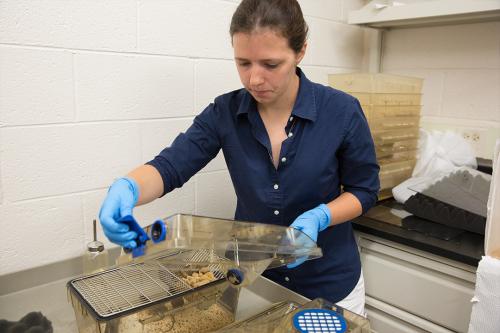PhD in Biological Sciences
Our past doctoral graduates are now successfully pursuing research and research-related careers at top universities and across private and government sectors. Moreover, our location in Washington, D.C., grants our graduate students access to numerous research institutions, museums and funding agencies located in and around our nation's capital.
Each doctoral program is tailored to the student and developed in consultation with an advisory committee. Doctoral candidates build close relationships with faculty and researchers, publish their work in national journals and pursue exciting projects in campus laboratory facilities.
Focus Areas
Students are provided the option to focus on one of two research areas:
"In my PhD research, every stage was a challenge. I found myself doing something I had never done before, and I love that feeling."
Daniela Campanella
PhD ’15
Guillermo Orti Lab
Funding
PhD candidates in biology generally receive five years of funding, and one additional year may be considered on a case-by-case basis. Students receiving funding must select a research advisor or co-advisor from within the Department of Biological Sciences.
Exams and Dissertation
Coursework is designed to prepare students for general examinations in three or more fields relevant to an area of interest. Following exams, students undertake dissertation research under the guidance of a dissertation director. The final examination is an oral defense of the dissertation.
Learn more about dissertation format and submission on the GW Libraries’ Electronic Theses and Dissertations (ETD) website.
Suggested Timeline
- Year 1: Meet with the biology director of graduate studies regarding any transfer credits; meet with chosen research advisor and General Examination Committee to execute a Program of Study; begin researching dissertation topics; identify possible members of the Dissertation Research Committee
- Year 2: Complete course work and take general examination within the following semester; pass general examination and advance to candidacy; write dissertation proposal and deliver accompanying oral presentation to committee
- Years 3–5: Register for BISC 8999 each semester; arrange periodic progress meetings with Dissertation Research Committee; complete dissertation; complete dissertation defense; submit final dissertation electronically to Gelman Library
Course Requirements
A completed Doctor of Philosophy in Biological Sciences degree requires 72 course credits. The following requirements must be fulfilled: 72 credits, including one 3-credit required course (Foundations in your subdiscipline), one 2-credit required course (Professional Development), and one 1-credit required course (Scientific Presentation), and 6 to 27 credits in thesis research.
To advance to candidacy, successful completion of at least 45 credits of approved graduate-level coursework and completion of a general examination, comprising both written and oral examinations, are required.
Students entering the program with a master's degree can petition to transfer up to 30 credits of graduate-level coursework into the program.
The following requirements must be fulfilled:
The general requirements stated under Columbian College of Arts and Sciences, Graduate Programs.
72 credits, including one-3-credit required course and 6 to 27 credits in thesis research.To advance to candidacy, successful completion of at least 45 credits of approved graduate-level coursework and completion of a general examination, comprising both written and oral examinations, are required. Students entering the program with a master's degree may be allowed to transfer up to 30 credits of graduate-level coursework into the program.
| Code | Title | Credits |
|---|---|---|
| Required courses | ||
| BISC 6205 | Foundations in Cell and Molecular Biology | |
| or BISC 6238 | Foundations of Ecology | |
| or BISC 6276 | Foundations in Evolution | |
| BISC 8999 | Dissertation Research (taken for at least 6 but no more than 27 total credits) | |
Students can choose to focus on one of two research areas: Cellular and molecular biology, or systemics, evolution, and ecology. Coursework is designed to prepare each student for a general examination in three specific fields of study relevant to their chosen research area. These fields of study are determined in consultation with an advisory committee appointed for the candidate.
Following the field examinations, students undertake dissertation research under the guidance of a dissertation director. The final examination is an oral defense of the dissertation.





